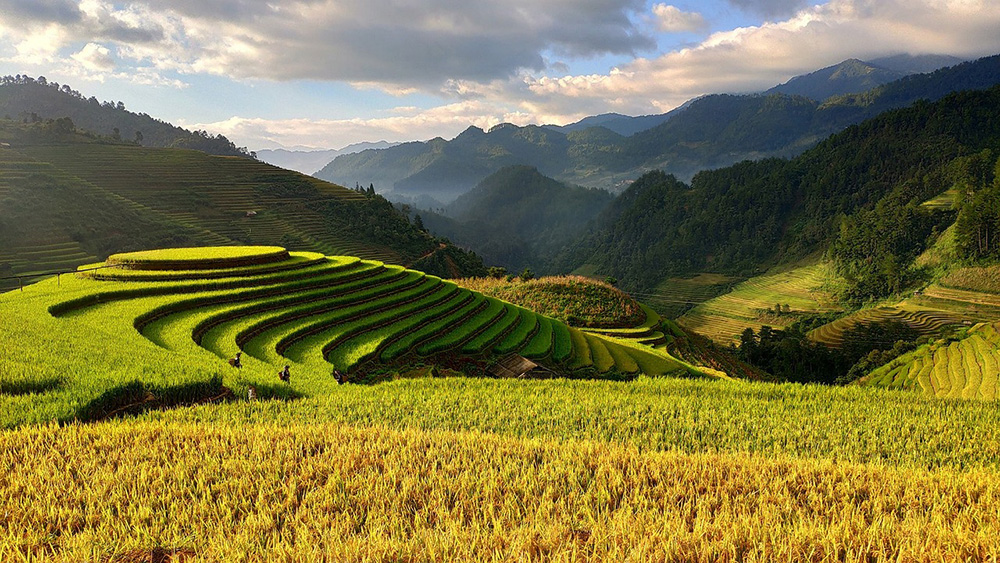Shuilian Cui, School of history, professor, Hebei University, BaoDing, China
In an era where the quest for sustainable development has taken center stage, the groundbreaking study Evaluation on the ecological philosophy of traditional Chinese agriculture and rural sustainable development has cast a spotlight on the profound implications of China’s ancient agricultural ecological philosophy, unveiling its immeasurable potential to inform and enhance modern rural sustainability. This pioneering research, led by a distinguished consortium of interdisciplinary experts, takes a deep dive into the enduring principles of intensive planting and diversified management—cornerstones that have historically underpinned the delicate balance of ecological harmony in agriculture.
By meticulously examining these traditional practices, the article demonstrates their remarkable capacity to strike a harmonious balance between the pursuit of economic prosperity and the critical task of environmental stewardship. It offers a persuasive argument for the continued relevance and practical application of this age-old wisdom in addressing the multifaceted environmental and economic challenges that confront us today.
The study goes beyond theoretical exploration, showcasing a compelling vision where historical insights and contemporary needs are not at odds, but rather converge in a mutually enriching synergy. It presents innovative solutions that are both respectful of our natural world’s delicate balance and supportive of the socio-economic vitality of rural communities.
This approach is not merely about sustaining the status quo, but about fostering a dynamic equilibrium that adapts to the evolving demands of our time. The research serves as a beacon, illuminating a path forward that is both environmentally conscious and economically viable. It challenges the conventional wisdom, urging policymakers, agricultural practitioners, and the broader scientific community to embrace a holistic approach to sustainability. This approach draws inspiration from the past, is grounded in the present, and is visionary in its gaze towards the future, ensuring that the legacy we leave is one of harmony, wisdom, and sustainable progress for all.
Under the leadership of a distinguished multidisciplinary team of experts in ecology, sociology, and agricultural economics, this comprehensive study synthesizes a diverse array of academic viewpoints. It embarks on an in-depth exploration of the philosophical concepts of “the unity of humanity with nature” and “conformity to nature,” scrutinizing their pertinence to pressing contemporary environmental dilemmas.

Image: Pixabay.
The methodology is a blend of rigorous historical review and practical modern implementation, yielding a sophisticated comprehension of the seamless integration of these venerable principles within current agricultural paradigms. This approach not only acknowledges the past but also innovates for the present, ensuring these principles are not merely revered but actively contribute to the advancement of sustainable agricultural methods that are ecologically sound and economically viable.
The study’s profound findings resonate as a clarion call to action, underscoring the transformative potential of traditional Chinese agricultural philosophy to revolutionize rural economies and steer them towards a paradigm of sustainability. This philosophy is not merely an academic concept, but a living, breathing ethos that advocates for harmony and symbiosis with the natural world. It illuminates the delicate interplay between agricultural practices and ecological balance, choreographing a dance that integrates socio-economic progress with the preservation of our environment, leading to a harmonious and synergistic evolution.
Transcending the boundaries of theoretical discourse, this research forges into the practical sphere, offering actionable strategies that are accessible and implementable. It serves as a bridge between the past and the present, offering a roadmap to policymakers and agricultural practitioners. This roadmap navigates the complex maze of sustainable development, providing clear signposts and tangible solutions that are both innovative and grounded in time-tested wisdom.
The implications of this study are far-reaching and profound, painting a picture of a future where the confluence of ancient wisdom and modern challenges gives rise to rural economies that thrive in tandem with the environment. It envisions a world where prosperity is not achieved at the expense of ecological health but is cultivated through a respectful and considerate interaction with nature. This approach sets a precedent for global agricultural practices, offering a sustainable model that can be adapted and embraced across different cultures and geographies.
The article’s message is clear: by embracing the principles of harmony, balance, and respect for nature, we can create rural economies that are resilient, vibrant, and sustainable. It is a call to action for all stakeholders in the agricultural sector to look to the past for guidance and to the future for inspiration, as we collectively strive to build a world that is in balance with nature’s rhythms and capable of meeting the needs of the present without compromising the ability of future generations to do the same.
Amidst the relentless global battle against environmental degradation and our quest for a balanced rural economy, the study’s conclusions emerge as a compelling reminder of the deep wisdom inherent in traditional Chinese agricultural thought. This research paints a visionary future for modern agriculture, which that takes root in the principles of green development and ecological balance, offering a bastion of hope amidst the challenges of today. This beacon of hope is not merely a theoretical aspiration; it is a tangible goal that promises to enhance rural livelihoods in a profound way. It aims to elevate the quality of life within rural communities, ensuring that the benefits of sustainable practices are felt by the people who are most closely connected to the land.
Moreover, it is a commitment to safeguarding our precious natural heritage, ensuring that the earth’s bounty is preserved for the generations that will follow us. The research extends an invitation to the scientific community and policymakers to delve deeper into these age-old concepts, urging a renaissance of thought that respects the past and is forward-looking in its application. This comprehensive approach to sustainability is not just an option; it is a necessity for crafting policies and practices that are durable, equitable, and in harmony with the natural world.
By embracing the profound foresight of traditional Chinese agricultural thought, we can cultivate a future where human progress and the planet’s well-being are not in conflict but in concert. This is essential for ensuring a harmonious coexistence that acknowledges our collective responsibility to the earth and to each other. The study’s call to action is a reminder that sustainability is not a distant goal but an immediate necessity. It requires our attention, our innovation, and our collective to achieve a balanced and vibrant rural economy that thrives in unity with nature.
To read the article, access
CUI, Shuilian. Evaluation on the ecological philosophy of traditional Chinese agriculture and rural sustainable development. Trans/Form/Ação [online]. 2024, vol 47, n. 5, e02400253 [viewed 31 October 2024]. https://doi.org/10.1590/0101-3173.2024.v47.n5.e02400253. Available from: https://www.scielo.br/j/trans/a/zDYmFfBWQk73HRM6kTXyXwJ
References
ARORA, N.K. and LSHA, M. United Nations Sustainable Development Goals 2030 and environmental sustainability: race against time. Environmental Sustainability [online]. 2019, vol. 2, no. 4, pp. 339-342 [viewed 31 October 2024]. https://doi.org/10.1007/s42398-019-00092-y. Available from: https://link.springer.com/article/10.1007/s42398-019-00092-y
BERAWI, M.L. The role of industry 4.0 in achieving Sustainable Development Goals. International Journal of Technology. 2019, vol. 10, no. 4, pp. 644-647.
HAN, M.H. Renewable Agriculture – Sustainable Agriculture Based on Land Conservation and Utilization. Chinese Agricultural Sciences. 2021, vol. 54, no. 5, pp. 1003-1016.
LIU, X.Q., ZHANG, Y.Y and ZHAO, X.Z. Research progress and prospects of sustainable agriculture and rural development. Human Geography. 2021, vol. 36, no. 2, pp. 91-101.
SZERSZYNSKI, B. Ecological rites – Ritual action in environmental protest events. Theory Culture & Society [online]. 2002, vol. 19, no. 3, pp. 51 [viewed 31 October 2024]. https://doi.org/10.1177/02632760240108152. Available from: https://journals.sagepub.com/doi/abs/10.1177/026327602401081521
External links
Trans/Form/Ação – TRANS: https://www.scielo.br/trans/
Trans/Form/Ação – Journal: Instagram | Facebook | Academia.edu
About Shuilian Cui
Shuilian Cui is mainly engaged in the research of modern North China regional history. She has received a first-class scholarship from Hebei University and participated in multiple provincial-level projects such as the planning and establishment of the Traditional Chinese Medicine Capital in Anguo City, the creation of the Chengde Mountain Villa Old Liquor Industrial Park, and the application for the Beidaihe Tourist Resort.
Como citar este post [ISO 690/2010]:

















Recent Comments